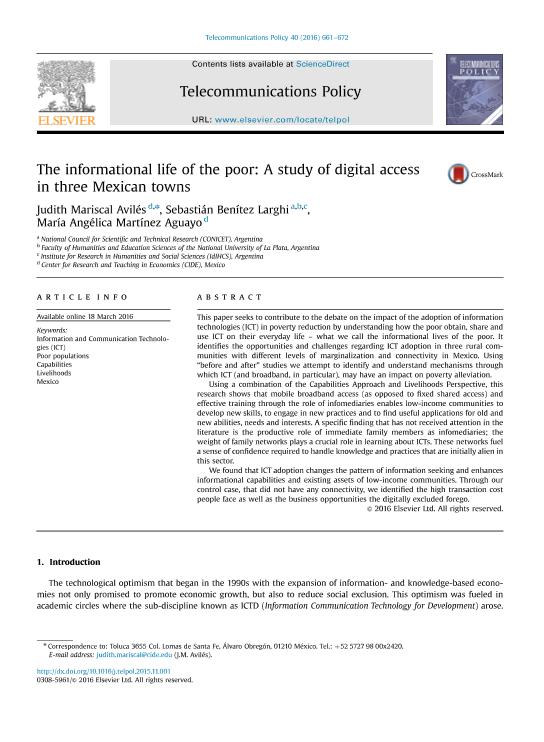Mostrar el registro sencillo del ítem
dc.contributor.author
Mariscal Avilés, Judith
dc.contributor.author
Benitez Larghi, Hector Sebastian

dc.contributor.author
Martínez Aguayo, María Angélica
dc.date.available
2020-03-25T19:05:05Z
dc.date.issued
2016-07
dc.identifier.citation
Mariscal Avilés, Judith; Benitez Larghi, Hector Sebastian; Martínez Aguayo, María Angélica; The informational life of the poor: A study of digital access in three Mexican towns; Elsevier; Telecommunications Policy; 40; 7; 7-2016; 661-672
dc.identifier.issn
0308-5961
dc.identifier.uri
http://hdl.handle.net/11336/100767
dc.description.abstract
This paper seeks to contribute to the debate on the impact of the adoption of information technologies (ICT) in poverty reduction by understanding how the poor obtain, share and use ICT on their everyday life – what we call the informational lives of the poor. It identifies the opportunities and challenges regarding ICT adoption in three rural communities with different levels of marginalization and connectivity in Mexico. Using “before and after” studies we attempt to identify and understand mechanisms through which ICT (and broadband, in particular), may have an impact on poverty alleviation. Using a combination of the Capabilities Approach and Livelihoods Perspective, this research shows that mobile broadband access (as opposed to fixed shared access) and effective training through the role of infomediaries enables low-income communities to develop new skills, to engage in new practices and to find useful applications for old and new abilities, needs and interests. A specific finding that has not received attention in the literature is the productive role of immediate family members as infomediaries; the weight of family networks plays a crucial role in learning about ICTs. These networks fuel a sense of confidence required to handle knowledge and practices that are initially alien in this sector. We found that ICT adoption changes the pattern of information seeking and enhances informational capabilities and existing assets of low-income communities. Through our control case, that did not have any connectivity, we identified the high transaction cost people face as well as the business opportunities the digitally excluded forego.
dc.format
application/pdf
dc.language.iso
eng
dc.publisher
Elsevier

dc.rights
info:eu-repo/semantics/openAccess
dc.rights.uri
https://creativecommons.org/licenses/by-nc-sa/2.5/ar/
dc.subject
CAPABILITIES
dc.subject
INFORMATION AND COMMUNICATION TECHNOLOGIES (ICT)
dc.subject
LIVELIHOODS
dc.subject
MEXICO
dc.subject
POOR POPULATIONS
dc.subject.classification
Otras Sociología

dc.subject.classification
Sociología

dc.subject.classification
CIENCIAS SOCIALES

dc.title
The informational life of the poor: A study of digital access in three Mexican towns
dc.type
info:eu-repo/semantics/article
dc.type
info:ar-repo/semantics/artículo
dc.type
info:eu-repo/semantics/publishedVersion
dc.date.updated
2020-03-18T20:39:59Z
dc.journal.volume
40
dc.journal.number
7
dc.journal.pagination
661-672
dc.journal.pais
Países Bajos

dc.journal.ciudad
Amsterdam
dc.description.fil
Fil: Mariscal Avilés, Judith. Centro de Investigación y Docencia en Economía; México
dc.description.fil
Fil: Benitez Larghi, Hector Sebastian. Consejo Nacional de Investigaciones Científicas y Técnicas. Centro Científico Tecnológico Conicet - La Plata. Instituto de Investigaciones en Humanidades y Ciencias Sociales. Universidad Nacional de La Plata. Facultad de Humanidades y Ciencias de la Educación. Instituto de Investigaciones en Humanidades y Ciencias Sociales; Argentina
dc.description.fil
Fil: Martínez Aguayo, María Angélica. Centro de Investigación y Docencia en Economía; México
dc.journal.title
Telecommunications Policy

dc.relation.alternativeid
info:eu-repo/semantics/altIdentifier/doi/https://doi.org/10.1016/j.telpol.2015.11.001
dc.relation.alternativeid
info:eu-repo/semantics/altIdentifier/url/https://www.sciencedirect.com/science/article/abs/pii/S0308596115001779
Archivos asociados
